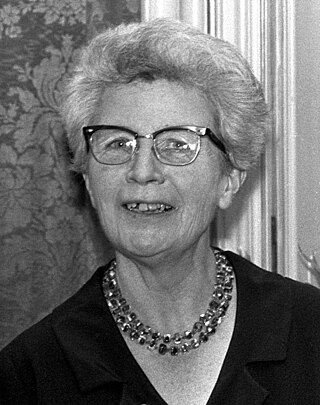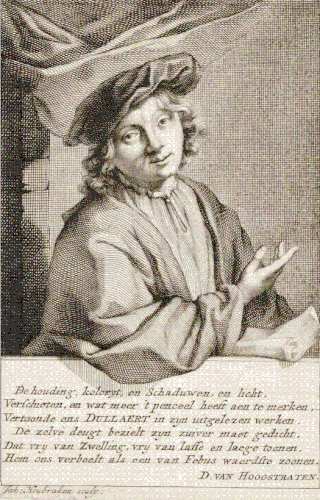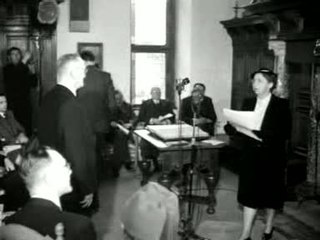Related Research Articles

The Gouden Griffel is an award given to authors of children's or teenagers' literature in the Netherlands.

Herman de Coninck was a Belgian poet, essayist, journalist and publisher.

Ida Gerhardt was a classicist and Dutch poet of a post-symbolist tradition.

The P.C. Hooft Award, inaugurated in 1948, is a Dutch-language literary lifetime-achievement award named after 17th-century Dutch poet and playwright Pieter Corneliszoon Hooft. The award is made annually.
Koenraad Logghe is a Flemish former proponent of the European New Right and practitioner of Germanic neopaganism, founder of the Werkgroep Traditie neopagan organization which he left in the summer of 2008. Under Logghe, Werkgroep Traditie combined neopaganism with "Traditionalism" in the sense of René Guénon and Julius Evola.

Gerrit Jan Komrij was a Dutch poet, novelist, translator, critic, polemic journalist and playwright. He rose to prominence in the early 1970s, writing poetry that sharply contrasted with the free-form poetry of his contemporaries. He acquired a reputation for his prose in the late 1970s, writing acerbic essays and columns often critical of writers, television programs, and politicians. As a literary critic and especially as an anthologist he had a formative influence on Dutch literature: his 1979 anthology of Dutch poetry of the 19th and 20th centuries, reformed the canon, and was followed by anthologies of Dutch poetry of the 17th and 18th centuries, of Afrikaans poetry, and of children's poetry. Those anthologies and a steady stream of prose and poetry publications solidified his reputation as one of the country's leading writers and critics; he was awarded the highest literary awards including the P. C. Hooft Award (1993), and from 2000 to 2004, he was the Dutch Dichter des Vaderlands. Komrij died in 2012 at age 68.
Frank Adam is a Flemish author, mostly writing plays and philosophical works. He began writing in 1992 and is a member of the editorial team of the Dutch-language literary periodical De Brakke Hond and in addition, he is a teacher at the writers academy in Bruges.

Johannes Adrianus Menne Warren was a Dutch writer. Much of his fame in the Netherlands derives from having published a collection of diaries in which he described his life and homosexual experiences in a country that deeply repressed homosexuality. He is also known for his poetry, his literary criticism, and his translations of poetry from Modern Greek.

Komrij's Patentwekker is a book of humorous poetry by Dutch author Gerrit Komrij, first published in 1974. The book contains four poems which outline a fictional invention—an alarm clock that consists of a burning candle inserted in the sleeper's anus, containing markings for each hour to be spent sleeping. The deeper the candle is inserted, the earlier the sleeper rises; the inventor acquires a patent on his idea. The four poems are formalist, like the rest of Komrij's poetry. They have three quatrains each, rhyming a b a b in pentametric lines.

Heyman Dullaert or Dullaart was a Dutch Golden Age painter and poet.

Lambertus Jozef (Bert) Bakker was a Dutch writer and publisher in the Netherlands. He wrote literary studies, two novels, poetry, and children's books. In World War II he was involved in the Dutch Resistance and assisted in the publication of Vrij Nederland. After the war he founded a publishing company under his own name; his nephew, also named Bert Bakker, ran the company until 1993. In 1953 he founded the literary magazine Maatstaf, which he edited until 1969. He was described as a "living legend" in the Dutch publishing industry, having supported and published authors such as Adriaan Roland Holst, Martinus Nijhoff, Gerrit Achterberg, and Neeltje Maria Min.
Uitgeverij Prometheus is a Dutch publishing company whose main focus is on literature, history and language. It was founded by Mai Spijkers in 1989. Bert Bakker is a notable imprint of Prometheus.
The Jan Campert Prize is a Dutch literary prize established in 1948, which is awarded annually for works of poetry by the Jan Campert Foundation. The foundation was created in 1948 to honour Jan Campert, considered by many to be an icon of the Dutch resistance.
De Nederlandse poëzie van de 19de en 20ste eeuw in 1000 en enige gedichten is a 1979 anthology of Dutch poetry. Compiled by poet and critic Gerrit Komrij and published by Bert Bakker, it quickly became a hotly discussed book and a yardstick for canonicity, nicknamed "The Bible of Dutch poetry". Controversy over Komrij's selection erupted almost immediately and even led to a lawsuit ; it is generally agreed, though, that the anthology has had significant influence on the canon of Dutch poetry.
LGBT writers in the Dutch-language area are writers from de Lage Landen, that is Flanders and the Netherlands,
Abe de Vries is a Frisian poet, essayist, literary critic, journalist, editor, translator and photographer.
Singel Uitgeverijen is a Dutch publishing group, headquartered in Amsterdam. Its subsidiaries are Nijgh & Van Ditmar, Querido Verlag, De Arbeiderspers, Athenaeum, Polak & Van Gennep, De Geus, and Volt. Books are also published directly by Singel Uitgeverijen.
Onherstelbaar verbeterd is a slim volume of poetry by Dutch poet Gerrit Komrij. Published in 1981 by Amsterdam publisher C. J. Aarts, it contained five pastiches of canonical Dutch (expressionist) sonnets, and five original sonnets. The five pastiches are of poems by Gerrit Achterberg, J. C. Bloem, Willem Kloos, Hendrik Marsman, and Martinus Nijhoff.
References
- ↑ Slot, Pim (1997). Een stille revolutie?: cultuur en mentaliteit in de lange jaren vijftig. Verloren. p. 36. ISBN 978-90-6550-549-1.
- ↑ Reitsma, Anneke (1998). Een naam en ster als boegbeeld: de poëzie van Ida Gerhardt in symbolistisch perspectief. Van Gorcum. p. 15. ISBN 978-90-232-3413-5.
- ↑ Blom, Onno (17 December 1998). "Een kroonluchter die weer brandt". Trouw . Retrieved 29 November 2010.
- ↑ "Week 6: Poëzie na 1945: Experimentelen en anti-experimentelen". Utrecht University . Retrieved 29 November 2010.
- ↑ Blom, Onno (2 March 2004). "'Deze waereld is niet voor mijn plezier ingericht' of: 'Hier irrt Komrij!'". Trouw . Retrieved 29 November 2010.
- ↑ Maas, Michel (19 March 1996). "Regels van Komrij uitgelegd aan lezers". de Volkskrant . Retrieved 29 November 2010.
- ↑ Blom, Onno (6 October 1999). "Arbeiderspers heft tijdschrift Maatstaf op". Trouw . Retrieved 29 November 2010.
- ↑ Fortuin, Arjen (August 1999). "De poëtische tegendraadsheid van Gerrit Komrij". NRC Handelsblad . Retrieved 29 November 2010.
- ↑ "Mensje van Keulen". VPRO . Archived from the original on 31 January 2010. Retrieved 29 November 2010.
- ↑ Schutte, Xandra (13 December 2006). "Mensje van Keulen: 'Als mijn personages ongelukkig zijn, voel ik me voldaan'". Vrij Nederland . Retrieved 29 November 2010.